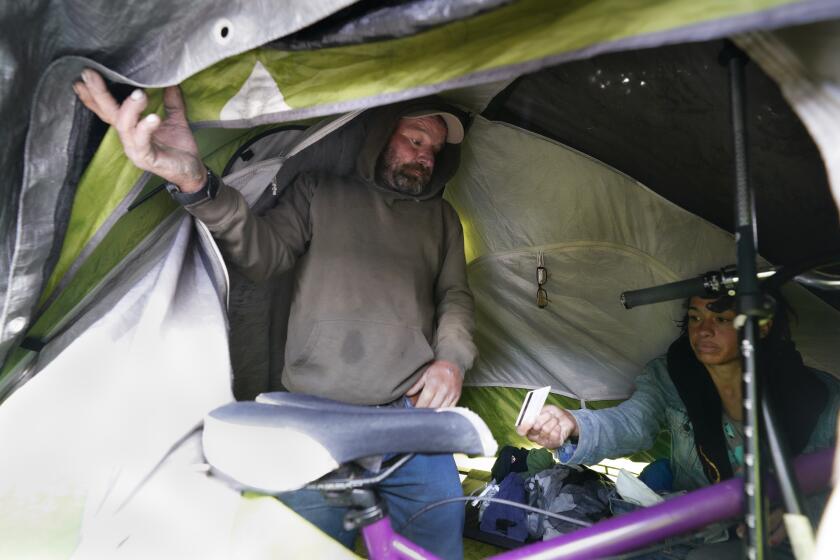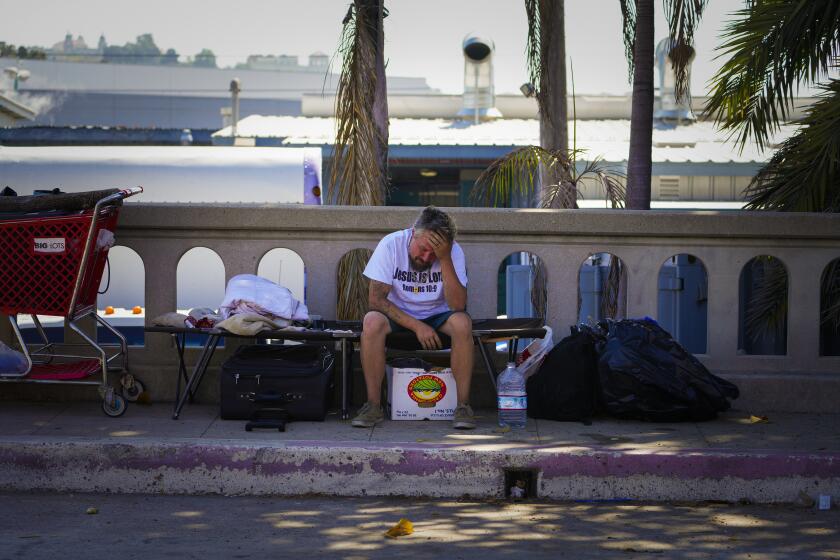Q&A: Superior Court judge candidate Paul Starita
The San Diego Union-Tribune Editorial Board submitted questions to candidates for San Diego County Superior Court. Paul Starita is seeking to fill Office 30, with is open due to a judge’s upcoming retirement. Here are his responses to the U-T Editorial Board’s questions
Please explain your legal background and why you are qualified to be a judge.
As an assistant U.S. attorney and U.S. Marine Corps judge advocate, I have served our county and country for 29 years. My legal experience, consisting of prosecuting and defending both criminal and civil cases as well as serving as a judicial officer, makes me uniquely qualified to handle any matter presented to me in a fair and impartial manner.
I have served as an assistant U.S. attorney for 16 years. As a federal prosecutor, I investigated and prosecuted over 500 felony cases including drug trafficking/organized crime, corruption and violent crime. As a civil trial attorney, I defend the United States in various lawsuits and prosecute civil health care and procurement fraud cases.
Now a Marine Colonel, I have served on active duty and in the Reserve for 29 years. My service includes four years as a military judge where I presided over jury and bench trials, motion hearings, guilty pleas and sentencings. Also, throughout my career, I served as a preliminary hearing officer in over 50 cases.
Why are you seeking this position?
I am seeking to become a Superior Court judge because I want to continue to serve our community in the most impactful way possible. I view service as a Superior Court judge as the pinnacle of public service. My extensive legal and life experience and personal characteristics will enable me to serve with distinction and make a positive impact in our community.
What one criminal justice reform is most needed or are you content with the criminal justice system as it is?
As a judge, it will be my duty to follow the law regardless of my personal views. That being said, there is never one change that will accomplish reform in an area as complex as criminal justice.
Proposition 47, passed in 2014, changed certain offenses from felonies to misdemeanors in order to save money on incarceration costs that could be reinvested in drug and mental health treatment as well as other services. Proposition 57, passed in 2016, reduced the lengths of prison sentences in order to incentivize offenders to improve their behavior and begin rehabilitation while in custody before transitioning to supervision.
These changes were intended to reduce recidivism and in turn, promote public safety. In order to compliment the role of the courts, such changes should include a comprehensive plan to increase funding for county probation offices. Probation offices must be properly staffed and funded to: 1) provide the appropriate input to courts on each offender; and 2) properly supervise those subject to early release.
The state Supreme Court is weighing an amendment to the judicial Code of Ethics that would allow a judge to publicly oppose a judicial candidate. The code now only allows judges to endorse for a judicial office. Do you support or oppose such a change?
I do not support this change to the code because it could have the unintended consequence of eroding or impairing judicial independence. A judicial endorsement speaks to confidence in a candidate’s qualifications and aptitude for service as a judge.
While I appreciate a sitting judge’s desire to defend herself or himself, especially when running for reelection, a judge advocating publicly in opposition to a candidate threatens judicial independence. Judges becoming an advocate under these circumstances calls into question their impartiality by transforming them into more of a political figure. Judicial independence is paramount and must be preserved. Our system of government depends it.
Meet the other candidates for San Diego County Superior Court judge for Office 30 below.
The San Diego Union-Tribune Editorial Board submitted questions to candidates for San Diego County Superior Court. Michael Murphy is seeking to fill Office 30, with is open due to a judge’s upcoming retirement. Here are his responses to the U-T Editorial Board’s questions
The San Diego Union-Tribune Editorial Board submitted questions to candidates for San Diego County Superior Court. Peter Murray is seeking to fill Office 30, with is open due to a judge’s upcoming retirement. Here are his responses to the U-T Editorial Board’s questions.
The San Diego Union-Tribune Editorial Board submitted questions to candidates for San Diego County Superior Court. Tim Nader is seeking to fill Office 30, with is open due to a judge’s upcoming retirement. Here are his responses to the U-T Editorial Board’s questions.
Get Weekend Opinion on Sundays and Reader Opinion on Mondays
Editorials, commentary and more delivered Sunday morning, and Reader Reaction on Mondays.
You may occasionally receive promotional content from the San Diego Union-Tribune.




